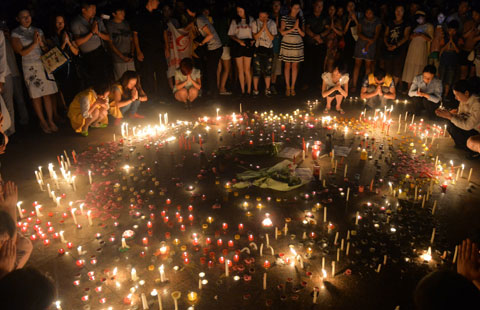Learn from Deng's diplomacy
Updated: 2014-08-21 06:51
By Gao Zhikai(China Daily)
|
|||||||||||
China Forum | Gao Zhikai
Vision, courage and wisdom are needed to arrive at the best solutions to international crises and maintain regional peace
This year marks the 110th anniversary of the birth of Deng Xiaoping. Although seventeen years have elapsed since Deng's passing away in 1997, China is still forging ahead in the overall direction of reform and opening-up to the outside world that Deng charted for China after he became the paramount leader at the end of the 1970s.
Although China is now facing a very different international situation and different challenges compared with those when Deng was the paramount leader, China's current diplomacy can still learn a lot from Deng's wisdom.
First, China should draw inspiration from Deng and avoid any arms race or military confrontation. Toward the middle of the 1980s, Deng concluded that, while the rivalry between the United States and the then Soviet Union was as tense as ever, a new world war was not likely to happen any time soon, if at all. Therefore, Deng decided that, while China still needed to achieve modernization of its national defense, it should devote as many resources as possible to develop its economy, rather than wasting precious resources on building up its military. One of the important decisions in this regard was to reduce the number of military personnel by one million.
This decision spared large resources for the country's economic development. Had China done otherwise, it would not have achieved its rapid economic development and profound improvement in the living standards of the Chinese people.
China should continue to make development its top priority and stand firmly for peace and development, not only in China, but in the world at large.
Second, Deng insisted that China should never seek hegemony. This policy of seeking no hegemony is still guiding China today. Even though China has become the second-largest economy in the world, and is expected to surpass the United States as the largest economy, possibly this decade, it does not seek hegemony or expansion.
Heeding Deng's wisdom, China should not seek to impose its own values or ways of thinking on other countries, and should treat all countries in the world as equals and with respect. China should not make the mistake of "overreaching" in its foreign policies as the US has done many times in recent years.
Third, China should always stand firm on matters of principle. This is why in the 1980s, Deng insisted that three preconditions should be satisfied before relations between China and the then Soviet Union could be improved: the Soviet Union's withdrawal of troops from Afghanistan, and troop withdrawals from the China-Soviet Union border and the China-Mongolian border, and the withdrawal of Vietnamese troops from Cambodia.
As a large and important country with many responsibilities in the world, China should make sure that it remains a reliable and highly predictable force, standing firmly for peace, development and conflict resolution within the framework of the United Nations Security Council.
Fourth, China needs smart diplomacy. While he always emphasized the importance of hard power and real strength in foreign affairs, Deng also emphasized the importance of smart power in diplomacy.
Smart diplomacy means having the vision, courage, and wisdom to arrive at the best solution to an international crisis without succumbing to the temptation of achieving instant gratification on the spur of the moment, or without taking any major action before having carefully thought through the immediate, medium-term and long-term consequences and implications of the action.
Examples include Deng's "One Country, Two Systems" proposal which resolved the impasse in the Sino-British negotiations over the future of Hong Kong, as well as his equidistant policy in the Iran-Iraq War in the 1980s, even though the United States at that time tried its best to persuade China to support Iraq and oppose Iran.
Now that the United States has fought two extremely costly wars in Iraq, and is once again becoming entangled in Iraq, the wisdom of Deng's policy of treating both Iran and Iraq the same in the 1980s has not only served China well throughout all these years, but also demonstrated the importance of vision, wisdom and smart power in major foreign affairs initiatives in the world today.
Blessed with Deng Xiaoping's foreign policy legacy, China should continue to follow the course he charted so it can be an important force for peace and development in the world in the decades to come.
The author was an English interpreter for Deng Xiaoping in the 1980s, and is director of the China National Association of International Studies.
(China Daily 08/21/2014 page8)
Today's Top News
Telegram good gesture from Pope to China
Japanese firms face $200m fine
Ice Bucket Challenge hits China
Gaza ceasefire talks collapsed
Heinz recalls four batches of infant food in China
WHO says Ebola has killed more than 1,200
Japan looking to buy more stealth fighters
2 Air Force jets collide in Italy, 4 airmen missing
Hot Topics
Lunar probe , China growth forecasts, Emission rules get tougher, China seen through 'colored lens', International board,
Editor's Picks

|

|

|

|

|

|





